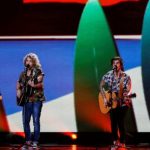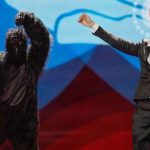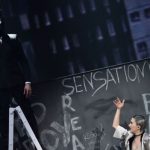Eurovision’s best moments
 Highlights from the Eurovision Song Contest in Kiev, Ukraine, which saw Portugal’s Salvador Sobral crowned the winner.
Highlights from the Eurovision Song Contest in Kiev, Ukraine, which saw Portugal’s Salvador Sobral crowned the winner.
Salvador SobralImage copyrightGETTY IMAGES
Image caption
Portugal’s Salvador Sobral sang For The Both Of Us, written by his sister Luisa. He got 758 points.
Portugal winnerImage copyrightGETTY IMAGES
Image caption
After winning, he performed the song again with his sister.
Lucie Jones for UKImage copyrightEPA
Image caption
Flying the flag for the United Kingdom was Lucie Jones, singing Never Give Up On You. She came 15th with 111 points.
Azerbaijan’s DihajImage copyrightGETTY IMAGES
Image caption
It wouldn’t have been Eurovision without Azerbaijan’s Dihaj, who sang Skeletons alongside a man wearing a horse’s head.
ItalyImage copyrightEBU
Image caption
Or, for that matter, Italy’s Francesco Gabbani and a dancing gorilla. They had been tipped for Eurovision success but in the end they came 6th with 334 points.
Eurovision FranceImage copyrightEPA
Image caption
France chose Alma to represent them this year. Her song, Requiem, was sung against a glowing backdrop of her capital’s best-known landmark, the Eiffel Tower.
Eurovision AustriaImage copyrightGETTY IMAGES
Image caption
This was the only moon people really wanted to see – Nathan Trent, 24, represented Austria with Running On Air. BBC One’s Graham Norton had to apologise after a Ukrainian prankster mooned during 2016 winner Jamala’s performance.
BulgariaImage copyrightEBU
Image caption
Kristian Kostov was Bulgaria’s entry with the song Beautiful Mess. At 17, he was this year’s youngest contestant and he came a highly respectable second with 615 points.
Eurovision RomaniaImage copyrightGETTY IMAGES
Image caption
Another memorable act was Romania’s yodelling rap entry Ilinca, featuring Alex Florea. He came seventh with 282 points.
Eurovision UkraineImage copyrightREUTERS
Image caption
Ukraine’s O Torvald couldn’t emulate last year’s success, coming 24th with just 36 points.
Eurovision SpainImage copyrightREUTERS
Image caption
Spain’s Manel Navarro came bottom this year with Do It For Your Lover, getting just five points.
For more on this story go to: http://www.bbc.com/news/entertainment-arts-39884264
What is Eurovision?
From Wikipedia:
The Eurovision Song Contest (French: Concours Eurovision de la chanson; sometimes popularly called Eurovision but not to be confused with the Eurovision network that broadcasts it) is the longest-running annual international TV song competition, held, primarily, among the member countries of the European Broadcasting Union (EBU) since 1956. The competition was based upon the existing Sanremo Music Festival held in Italy since 1951.
Each participating country submits an original song to be performed on live television and radio and then casts votes for the other countries’ songs to determine the most popular song in the competition. The contest has been broadcast every year for sixty-two years, since its inauguration in 1956, and is one of the longest-running television programmes in the world. It is also one of the most watched non-sporting events in the world, with audience figures having been quoted in recent years as anything between 100 million and 600 million internationally. Eurovision has also been broadcast outside Europe to several countries that do not compete, such as the United States, Canada, New Zealand, and China. An exception was made in 2015, when Australia was allowed to compete as a guest entrant as part of the celebration of the 60th anniversary of the event. In November 2015, the EBU announced that Australia was invited back as a participant in the 2016 contest after their success in 2015. Following their success again in 2016, Australia competed again in 2017. Since 2000, the contest has also been broadcast over the Internet via the Eurovision website.
Winning the Eurovision Song Contest provides a short-term boost to the winning artists’ career, but rarely results in long-term success. Notable exceptions are ABBA (winner in 1974 for Sweden), Bucks Fizz (winner in 1981 for the United Kingdom) and Céline Dion (winner in 1988 for Switzerland), all of whom launched successful worldwide careers after their wins.
Ireland holds the record for the highest number of wins, having won the contest seven times—including four times in five years in 1992, 1993, 1994 and 1996. Under the current voting system, the highest scoring winner is Salvador Sobral of Portugal who won the 2017 contest in Kiev, Ukraine, with 758 points. Under the previous system, in place from 1975 to 2015, the highest scoring winner is Alexander Rybak of Norway with 387 points in 2009.
















